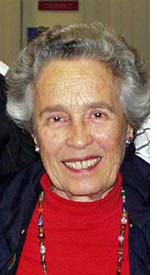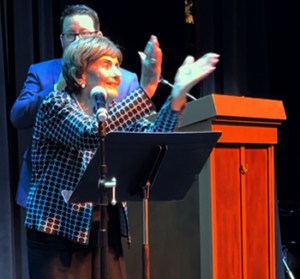
LA JOLLA, California — Treasures from the Music Collection of the Astor Judaica Library will feature a three-part series of recorded music from the Holocaust. The free programs will take place in the JCC library Thursday afternoons from 2-3:30 p.m., April 27, “Songs of the Ghettos,” with guest Fanny Krasner Lebovits; May 11, “Music from Terezin” with guest Sandy Scheller; and June 1, “Music by Refugee Composers” with guest David Amos.
Treasures from the Music Collection programs are sponsored by the Astor Judaica Library and the JCC Senior Department, Melanie Rubin, director, Alyssa Miklos, Senior and Adult Program Coordinator. “Music from Terezin” will be co-sponsored by “We Are The Tree Of Life,” Jacqueline Simha Gmach, Director.
“Songs of the Ghettos” on April 27 will feature 12 examples sung by outstanding recorded voices such as Chava Alberstein, Jan Peerce, Emma Schaver, Sidor Bilarsky, and Mandy Patinkin.
“Ani Ma’amin,” which became one of the most well-known songs of the Shoah, was composed by a Modzitzer Hasid on a train headed to Treblinka.

“Rifkele di Shabesdike” (Rifkele, the Sabbath One) recalls the women who were left widowed when, on the Sabbath, the Jewish men in the Bialystok Ghetto were liquidated by the Nazis.
“Eili, Eili” (My God, My God), a plea to save the Jewish people, and “Es Brent” (It Is Burning) were written prior to WWII, but sung frequently in the Ghettos and camps.
Two lighter songs are “Drei Yingelach” (Three Little Boys) and “Ich Heys Yisrolek” (I’m Named Yisrolek) The last was written in the Vilna Ghetto with words by Leyb Rozental and music by Misha Weksler, Director of the ghetto’s musical theater, who was sent to the gas chamber.
“The Moorsoldaten” was one of Europe’s most well-known protest songs, composed in the first Nazi concentration camp for political prisoners, Boergermoor. The other legendary song of defiance, concluding the program, will be the partisan song, “Zog Nit Keyn Mol” (Never Say) with lyrics by Hirsh Glik music by Dmitri Pokrass. The song became the hymn of the United Partisan Organization in 1943. It spread to all the camps in Eastern Europe and later to all Jewish communities the world over.
Fanny Krasner Lebovits, who celebrated her 100th birthday last year, will introduce some of the songs and tell about her experiences. She survived the Libau Ghetto in Latvia and five Nazi concentration camps.
Will these programs be recorded? Will they be via Zoom or some other option?